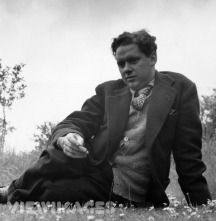Stanza
usually a repeated grouping of three or more lines with the same meter and rhyme scheme.
Do not go Gentle into that Good Night
Dylan Thomas
Do not go gentle into that good night,
Old age should burn and rave at close of day;
Rage, rage against the dying of the light.
Though wise men at their end know dark is right,
Because their words had forked no lightning they
Do not go gentle into that good night.
Good men, the last wave by, crying how bright
Their frail deeds might have danced in a green bay,
Rage, rage against the dying of the light.
Wild men who caught and sang the sun in flight,
And learn, too late, they grieved it on its way,
Do not go gentle into that good night.
Grave men, near death, who see with blinding sight
Blind eyes could blaze like meteors and be gay,
Rage, rage against the dying of the light.
And you, my father, there on the sad height,
Curse, bless me now with your fierce tears, I pray.
Do not go gentle into that good night.
Rage, rage against the dying of the light.
A stanza is usually a repeated grouping of three or more lines with the same meter and rhyme scheme. An example of this is “Do not go Gentle into that Good Night” by Dylan Thomas. The stanzas in this poem contain three sentences, and the last one contains four. The first two lines in each stanza rhyme, while the second line in each stanza rhyme with the second lines in all the other stanzas.

"Great is the hand that holds dominion over man by a scribbled name." ~Dylan Thomas
Dylan Thomas

Dylan Thomas was born in Swansea, South Wales on October 27th 1914, the son of the English Master of Swansea Grammar School, where Dylan was later educated. He began writing poetry as a schoolboy before taking his first job as a junior reporter for the South Wales Evening Post in 1931. His first volume of verse Eighteen Poems was published in 1934 prior to a move to London where he worked in journalism, broadcasting and script-writing. His next volume, Twenty Five Poems was completed and published in 1936. In the same year, Dylan married Caitlin Macnamara and they moved to Laugharne in Carmarthenshire, South West Wales. During World War II, Dylan spent most of his time in London where he wrote & broadcast for the BBC.
In 1940 Portrait Of The Artist As A Young Dog - a collection of short stories, brought him widespread critical acclaim. He also wrote several plays and scripts including TheDoctor And The Devils. Deaths And Entrances which followed in 1946, contained some of his finest poetry and resulted in his being invited to lecture in the USA. Thomas eventually visited the USA on four separate tours which paid handsomely, enabling the upkeep of his family back in Wales. His heavy drinking, however, had seriously weakened his health and on 9th November 1953, after a famous binge in the White Horse Pub in New York, he died, ostensibly of alcoholic poisoning - although it has since been suggested that he, being diabetic, entered a fatal diabetic coma induced by excessive alcohol. His body was returned home and buried in Laugharne with a simple wooden cross marking his grave. He was 39. Under Milk Wood and Quite Early One Morning,a collection of his works for the BBC were published posthumously in 1954.
(http://www.theatretoursinternational.com/Biographies/Artistes/DylanThomasBiog.html)
